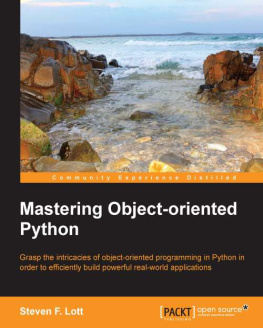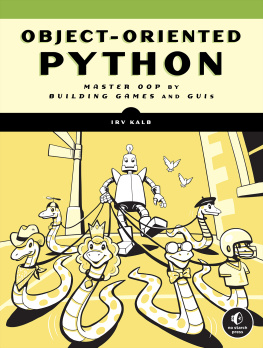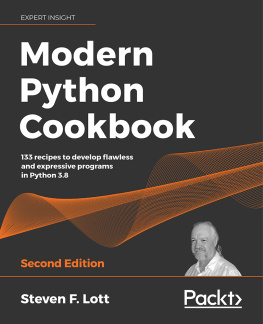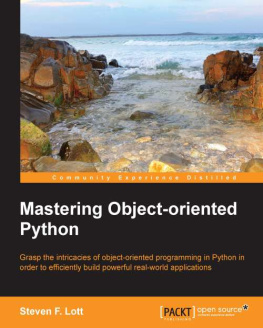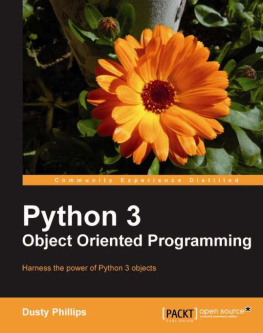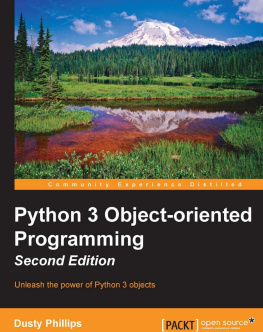Fatouhi Duraid - Mastering object-oriented Python
Here you can read online Fatouhi Duraid - Mastering object-oriented Python full text of the book (entire story) in english for free. Download pdf and epub, get meaning, cover and reviews about this ebook. year: 2014, publisher: Packt Publishing, genre: Computer. Description of the work, (preface) as well as reviews are available. Best literature library LitArk.com created for fans of good reading and offers a wide selection of genres:
Romance novel
Science fiction
Adventure
Detective
Science
History
Home and family
Prose
Art
Politics
Computer
Non-fiction
Religion
Business
Children
Humor
Choose a favorite category and find really read worthwhile books. Enjoy immersion in the world of imagination, feel the emotions of the characters or learn something new for yourself, make an fascinating discovery.
- Book:Mastering object-oriented Python
- Author:
- Publisher:Packt Publishing
- Genre:
- Year:2014
- Rating:4 / 5
- Favourites:Add to favourites
- Your mark:
Mastering object-oriented Python: summary, description and annotation
We offer to read an annotation, description, summary or preface (depends on what the author of the book "Mastering object-oriented Python" wrote himself). If you haven't found the necessary information about the book — write in the comments, we will try to find it.
- Create applications with flexible logging, powerful configuration and command-line options, automated unit tests, and good documentation
- Use the Python special methods to integrate seamlessly with built-in features and the standard library
- Design classes to support object persistence in JSON, YAML, Pickle, CSV, XML, Shelve, and SQL
An object-oriented approach to Python web development gives you a much more fully-realised experience of the language. The flexibility and power of Python, combined with the improvements in design, coding and software maintenance that object-oriented programming allows, is built to respond to the challenges of increasingly more complex and data-intensive application development, making difficult tasks much more manageable. This book has been designed to make this sophisticated approach to programming easier to learn quickly, providing you with a clear and coherent learning journey.
Beginning by looking at a range of design patterns for the _init_() method, you will learn how to effectively use a range of Python s special methods to create classes that integrate with Python s built-in features, and find detailed explorations and demonstrations of callables and contexts, containers and collections, numbers, and decorators and mixins, with a focus on best practices for effective and successful design. The book also features information that demonstrates how to create persistent objects using JSON, YAML, Pickle, CSV, XML, Shelve and SQL and shows you how to transmit objects between processes. Going further into OOP, you ll find expert information on logging, warnings, unit testing as well as working with the command line.
Structured in 3 parts to make the complexity of OOP more manageable - Pythonic Classes via Special Methods, Persistence and Serialization and Testing, Debugging, Deploying, and Maintaining this book offers deep insight into OOP that will help you develop expert level object-oriented Python skills.
What you will learn- Create applications with flexible logging, powerful configuration and command-line options, automated unit tests, and good documentation
- Get to grips with different design patterns for the __init__() method
- Design callable objects and context managers
- Perform object serialization in formats such as JSON, YAML, Pickle, CSV, and XML
- Map Python objects to a SQL database using the built-in SQLite module
- Transmit Python objects via RESTful web services
- Devise strategies for automated unit testing, including how to use the doctest and the unittest.mock module
- Parse command-line arguments and integrate this with configuration files and environment variables
Steven F. Lott has been programming since the 70s, when computers were large, expensive, and rare. As a contract software developer and architect, he has worked on hundreds of projects, from very small to very large. Hes been using Python to solve business problems for over 10 years.
Table of Contents- The _init_() Method
- Integrating Seamlessly with Basic Python Special Methods
- Attribute Access, Properties, and Descriptors
- The ABCs of Consistent Design
- Using Callables and Contexts
- Creating Contrainers and Collections
- Creating Numbers
- Decorators and Mixins: Cross-Cutting Aspects
- Serializing and Saving JSON, YAML, Pickle, CSV, and XML
- Storing and Retrieving Objects via Shelve
- Storing and Retrieving Objects via SQLite
- Transmitting and Sharing Objects
- Configuration Files and Persistence
- The Logging and Warning Modules
- Designing for Testability
- Coping with the Command Line
Fatouhi Duraid: author's other books
Who wrote Mastering object-oriented Python? Find out the surname, the name of the author of the book and a list of all author's works by series.

